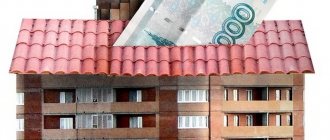Due to the fact that the free privatization of housing had already been intended to be stopped several times and this procedure was periodically extended, giving the opportunity to formalize it to all those who had not yet done so, many citizens hastily prepared documents and chaotically tried to assess how feasible it was. The need for haste disappeared when it was decided that the privatization of apartments in Russia was now indefinite.
Today, quite a few people still have an apartment that has not been privatized, and the reasons for this are very different. The most important advantage of transferring real estate from municipal property to personal property is that it is possible to do it for free. This is a very significant nuance, since the cost of housing is disproportionately high and the majority of the population simply cannot afford
such a purchase without a mortgage.
However, it is worth understanding that the transfer of property into personal ownership affects not only the legal status of housing. With privatization, some advantages are lost and others are gained. The right to free re-registration of social housing is granted only to citizens of the Russian Federation and only once in their entire life.
For low-income people
A non-privatized apartment is not the property of its residents, cannot be inherited by anyone, and while living in it, it is necessary to strictly monitor compliance with the rules, if possible without conflicting with neighbors, who sometimes don’t even mind where to complain. However, transferring housing into private ownership is not beneficial for everyone, so you need to carefully analyze everything before making a decision.
Dear readers!
Our articles talk about typical ways to resolve legal issues, but each case is unique. If you want to find out how to solve your specific problem, please contact the online consultant form on the right →
It's fast and free!
Or call us by phone (24/7):
If you want to find out how to solve your particular problem, call us by phone. It's fast and free!
+7 Moscow,
Moscow region
+7 Saint Petersburg,
Leningrad region
+7 Regions
(the call is free for all regions of Russia)
For example, low-income citizens and families with this status should not rush. Despite the fact that after privatization, real estate can be fully disposed of by concluding all kinds of transactions, the transfer of rights entails additional costs. Firstly, an additional item appears in the payment of utilities - major repairs and maintenance of common household property. Secondly, owners of real estate are required to pay taxes on them, the amount of which increases annually.
In addition, low-income people must think ahead, since living in a municipal apartment gives them the right to apply for improved housing conditions. If the real estate is privatized, the size of housing will have to be increased at their own expense without government assistance.
How to solve the problem for pensioners?
For pensioners, there is also no clear answer as to which decision is best to make. Living in a municipal apartment allows you to save on taxes and utilities, and almost completely reduces the risk of encountering scammers. However, it is impossible to bequeath such living space. It is also impossible to issue a deed of gift. In fact, residents who have entered into a social rental agreement with the municipality have the right only to use the property for its intended purpose and nothing more. If the pensioner has no direct heirs and no one needs to leave the apartment, there is no need to privatize it.
On the other hand, after privatization, pensioners receive the right to draw up an annuity agreement with lifetime maintenance. This is beneficial for the owner, who, according to the terms of the contract, will be supported for the rest of his life and will be free from any expenses, including utility bills, as well as for the other party, who will eventually receive ownership of the apartment.
However, pensioners should not forget that after privatization of housing is completed, they can become a tempting target for scammers. Therefore, you need to be extremely careful with your decision making and subsequent actions.
general information
Let's figure it out - what is privatization, which has been talked about so much since the early 90s of the last century?
The main objective of the process is to transfer ownership of apartments that were previously on the balance sheet of the state housing stock to Russian citizens. This, on the one hand, will allow the country to get rid of the need to maintain it, and on the other hand, it will create a culture of private property among the population.
The topic of privatization first became relevant in 1991, that is, immediately after the collapse of the Soviet Union. At that time, the standard of living in the country fell sharply, and, accordingly, budget revenues decreased, which ultimately led to a reduction in its expenditure. It has become expensive for the state to properly maintain many thousands of houses. Transferring them to the balance sheets of municipalities did not solve all the problems, since in the regions the economic situation was also deteriorating every day.
Risks with debt
As you know, a significant feature if the apartment is not privatized is the fact that residents are required to pay utility bills on time and in full. Despite the fact that this is the responsibility of all citizens without exception, debt in municipal housing threatens with rapid and unconditional eviction without the provision of other living space and the right to re-sign the contract in the future.
Accordingly, the issue of the possibility of privatizing an apartment for which there is arrears for utilities should be considered. However, it is worth noting the fact that payment of utilities and the housing privatization procedure are not related to each other. This means that no one has the right to refuse to re-register rights on the basis of debts. Such actions are arbitrary, which means you can file a complaint with law enforcement agencies or further with the prosecutor’s office. However, we must not forget that even after the privatization of the apartment, the debts will not disappear and you will still have to pay them.
In addition, even real estate that is personally owned has the right to be taken away and sold at auction for utility debts.
Is shared ownership beneficial?
It is also worth knowing: what is shared privatization of an apartment, the pros and cons of such a process.
A problematic issue is the general privatization of an apartment, the residents of which do not have a unanimous opinion regarding the future owner of the property.
For example, children cannot decide the fate of the living space inherited from their parents where they are registered.
The apartment is a single property complex .
And it is impossible to privatize it piecemeal . As a result, the housing will be in shared ownership of all family members who were registered in it.
Of course, it will be possible to divide the apartment into parts , assigning, if possible, certain rooms to each of the owners. But in such a situation, privatization loses its main advantages.
Other owners will not allow you to dispose of the entire property, and it will be very difficult to sell one room . People are simply not ready to pay a lot of money for real estate and live, in fact, in a communal apartment, which the state has been trying to get rid of for so many decades.
Owning part of a residential property will not provide, in fact, any advantages for the owners, except for increased, albeit slightly, costs.
In this case, it is best to wait . One of the relatives may move, get discharged, or buy their own home. Children may appear in the family, which will make it possible to apply for a larger apartment .
If you have not yet managed to register ownership of your home, then read how to privatize an apartment under a social tenancy agreement. Find out here who should change the battery, electric meter and balcony in a privatized apartment.
6 ways to find out whether an apartment is privatized or not are described at the link.
What is good about privatization?
Despite everything mentioned earlier, there is no need to be afraid of privatization. This process, on the other hand, is very tempting and very beneficial for many citizens:
- It becomes possible to independently decide who and when to register in your living space, without asking anyone for permission (with the exception of co-owners, if there are any);
- The right to sell an apartment, exchange it for other real estate, rent it out, transfer it to a non-residential fund and rent it out, bequeath it, donate it or enter into any other transaction;
- No one will be able to deregister or evict the owner of the apartment unless he is a flagrant violator of the rules of living in an apartment building, but even in this case the process is very complicated. In addition, you cannot evict a person from a privatized apartment if he has no other housing.
The biggest advantage of re-registration of municipal property is the confidence that the apartment really belongs to its owners, who are no longer just tenants. Circumstances are different, neighbors are not very friendly, therefore, despite the fact that the agreement with the municipality may be indefinite, this does not guarantee absolutely anything.
What can happen to people living in non-privatized housing?
As noted above, the person who signed the contract can safely use the apartment given to him for life. But in reality, in this case, municipal housing will not truly become your own.
The slightest violation of living conditions will allow the municipality to literally evict a person onto the street. At the same time, the presence of tenants who refused privatization will create problems for the remaining co-owners who decide to sell the resulting premises.
It is also impossible to bequeath a municipal apartment - it, regardless of the wishes of the responsible tenant, will pass after his death to those who are registered under the same roof with him.
Generating income
An apartment can remain non-privatized for as long as desired, especially now that free privatization of housing has become indefinite in Russia. However, since this is the property of the municipal body, all that residents can do is live in the living space allocated to them and, with the permission of the administration, register one of their relatives there.
After privatization, the owners become full managers of the property and can make a profit from it. This refers to the transfer of housing for rent as an additional source of income. To carry out such a deal with social housing is not only illegal, but also fraught with very serious consequences, including eviction.
The nuances of renting out privatized housing:
- The rental agreement is concluded in writing. Moreover, it is subject to mandatory state registration if we are talking about a long-term transaction for more than a year;
- If the transaction is concluded with an individual, it is a rental, if with a legal entity, it is a lease;
- A formal agreement obliges owners who rent out an apartment to pay taxes on such income. Their size depends on the transaction amount.
Advantages of non-privatized housing
Of course, the privatization of municipal housing also has its drawbacks. First of all, it is important to point out that this is a very lengthy process, requiring the preparation of a lot of documents and visits to many officials, often several times. However, other disadvantages become noticeable after registration.
Firstly, this is mandatory taxation. Owners of privatized apartments cannot avoid this. Only residents of municipal housing do not pay. At the same time, annual percentage increases in taxes are planned at the state level. In addition, the amount depends on the cadastral value of the apartment, which is significantly higher than the market value in this matter.
Secondly, as already mentioned, an increase in utility bills, to which is added the operation of an apartment building with common household property. And, of course, it is worth mentioning more than once that there are still a lot of scammers in the real estate industry. In case of alienation and when exchanging an apartment, you will have to be extremely careful so as not to become the next victims of scammers. As practice shows, it is very rarely possible to bring them to justice even through the courts.
What and how much will you have to pay for in a privatized apartment?
Let us again turn to the law of the Russian Federation “On the privatization of housing stock in the Russian Federation” dated July 4, 1991. According to it, every tenant of a municipal apartment has the opportunity to register ownership of it (free of charge and only once in a lifetime).
The monthly payment for a privatized apartment consists of the following items:
- The cost of maintaining a living space.
- Overhaul fee.
- Tax on an apartment, calculated from its cadastral value. In Moscow, the rate is calculated according to a progressive principle: the more expensive the apartment, the higher it is.
- Utility payments according to meters and general expenses of an apartment building (on the same principle as for municipal apartments).
To calculate this, let’s take an apartment similar to a municipal one - Moscow, 80 sq.m., a house with all amenities, second floor. So, for a privatized apartment you will pay:
- For the maintenance of residential premises: 30.49*80=2439.2 rubles.
- The contribution for major repairs is 18.86 rubles per sq. m. meter per month. That is, for an apartment of 80 sq.m. you will pay 1508.8 rubles.
- Let's say our hypothetical apartment is 80 sq.m. costs 9 million rubles. You will have to pay 0.1%, that is, 9,000 rubles per year. This amount is divided among all owners. If you divide this amount by 12 months, you get 750 rubles per month.
- Total: 2439.2+1508.8+750= 4698 rubles per month plus utility bills at tariffs in accordance with metering devices.
It turns out that for a privatized apartment with an area of 80 sq.m. A monthly fee of RUB 4,948 is charged. plus utilities.
Main consequences
In fact, a person who does not privatize an apartment does not lose anything and this does not have any negative consequences for him. The municipality signs open-ended contracts with citizens, therefore, if the tenants are respectable, they cannot evict them. The grounds for forced eviction from municipal housing are reflected in Article 83 of the Housing Code of the Russian Federation.
Previously, when it came to ending free privatization, tenants who did not exercise their right to it could only apply for this procedure on a paid basis. If they were unwilling, the residents would simply be evicted. Now, with the acceptance of the indefinite nature of housing privatization in Russia, this is no longer relevant.
However, other rules remained unchanged. For example, tenants who have heirs should remember that after their death they will not be able to transfer the housing. It will return to the ownership of municipal authorities and can be given to anyone. If the heirs lived with the testator and were registered in a municipal apartment, they have the right to re-register the social tenancy agreement in their name.







